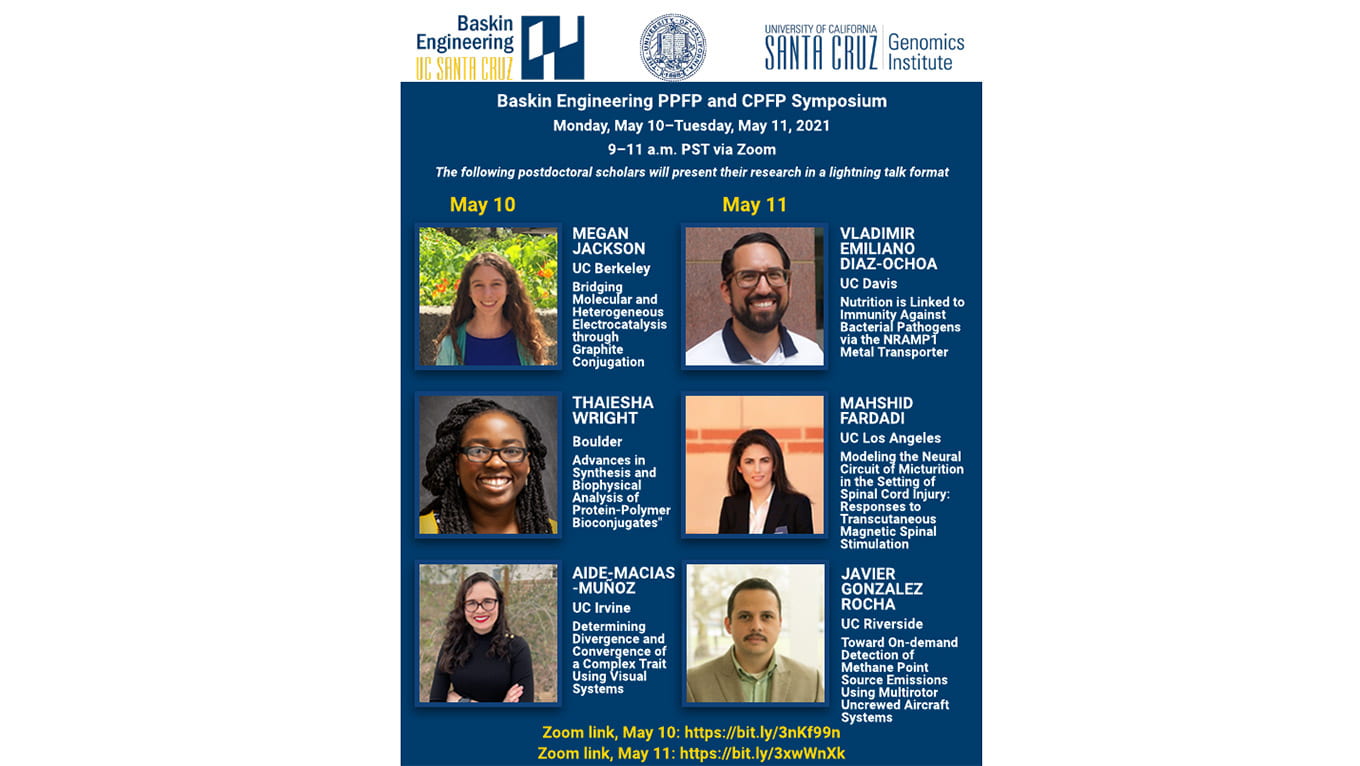On May 10-11, the Baskin School of Engineering, in partnership with the UC Santa Cruz Genomics Institute, hosted their first annual UC President’s Postdoctoral Fellowship Program (PPFP) and Chancellor’s Postdoctoral Fellowship Program (CPFP) Symposium. The two-day, virtual event showcased the research of six postdoctoral fellows from across the UC system and brought in over 80 attendees each day.
The University of California’s President’s Postdoctoral Fellowship Program was established in 1984 to encourage outstanding women and minority Ph.D. recipients to pursue academic careers at the University of California. The goal of the program is to provide research opportunities and career development for scholars whose work will enhance the diversity of the academic community at the University of California.
The research presented in the symposium spanned the fields of biomolecular engineering, mechanical engineering, aerospace engineering, genetics, chemistry, and molecular, cellular, and developmental biology.
The featured speakers, listed with their current institutions, were:
- Vladimir Emiliano Diaz-Ochoa, Ph.D., UC Davis
- Mahshid Fardadi, Ph.D., UCLA
- Javier González-Rocha, Ph.D., UC Riverside
- Megan Jackson, Ph.D., UC Berkeley
- Aide-Macias Muñoz, Ph.D., UC Irvine
- Thaiesha Wright, Ph.D., UC San Diego and University of Colorado, Boulder
Vladimir Emiliano Diaz-Ochoa’s postdoctoral research explores host-pathogen interactions in the intestines and the use of probiotics to help fight off infections. During his Ph.D. studies at UC Irvine, he held the position of Chair for DECADE Student Council. DECADE aims to increase the number of minority and women students pursuing doctoral studies at UC Irvine. Diaz-Ochoa received his bachelor’s degree in biological sciences at UC Irvine, then continued at UC Irvine pursuing a Ph.D. in biomedical sciences with a concentration in immunology and microbiology. When Diaz-Ochoa is not conducting research, he mentors students from underrepresented backgrounds.
Mahshid Fardadi holds a M.Sc. from Sharif University of Technology in Tehran, an MBA from UCLA, and a Ph.D. in mechanical engineering from UC Irvine. Fardadi worked in the field of dynamical system modeling and controls during her doctoral studies and is the founder and CEO of Prolinkd Inc. Her Chancellor’s Postdoctoral Fellowship has allowed her to further her research on feedback control theory for central pattern generator and neural circuit functionality in patients with spinal cord injuries. Fardadi’s goal is to design a feedback controller that can replace the natural feedback control in humans who have suffered damage to their nervous systems.
Javier González-Rocha, who lived in Michoacán, Mexico, and Watsonville, California, before beginning his undergraduate and doctoral studies in mechanical and aerospace engineering, led the effort to institute a chapter of the Graduate Society of Hispanic Professional Engineers at Virginia Tech. A Virginia Tech news article recognized González-Rocha’s contributions in “raising awareness about issues in higher education, human rights, and social justice” through his involvement in campus organizations and activities. González-Rocha’s research aims to develop model-based algorithms to sense wind in the atmospheric boundary layer using multirotor uncrewed aircraft systems. His interest and expertise in aeronautical engineering are complemented by personal aeronautical certifications, including Aviation Safety Officer (ASO), Pilot-in-Command (PIC), Crew Resources Management (CRM), Visual Observer (VO), and Remote Pilot Certification.
Megan Jackson’s interest in chemistry began in high school where she was often encouraged by her chemistry teacher to design her own research, a task that allowed her to combine her chemistry expertise with her sense of creativity. Jackson received her bachelor’s degree in chemistry from Caltech in Pasadena, California, and her Ph.D. in chemistry from MIT. At MIT, Jackson was awarded a 2019 Graduate Woman Excellence award for outstanding leadership and academic accomplishments. Jackson is an Arnold O. Beckman Postdoctoral Fellow in Professor Jeffrey Long’s Group at UC Berkeley, where she studies the molecular principles behind the crystallization of metal-organic frameworks. Her goal is to create her own research lab to help train the next generation of scientists.
Aide-Macias Muñoz is an advocate for diversity in STEM who spent much of her undergraduate and graduate studies participating in outreach activities aimed at increasing representation of Chicano, Hispanic, and Native American students in the sciences. Muñoz earned her bachelor’s degree in integrative biology at UC Berkeley, then went on to complete a master’s and a Ph.D. program in biological sciences from UC Irvine. As a postdoctoral fellow at UC Irvine, Muñoz studies the use of visual systems to determine the molecular mechanisms driving divergence and convergence of a complex trait in invertebrates, such as moths, butterflies, and jellyfish.
Thaiesha Wright is a researcher in chemistry and biochemistry who seeks to broaden the reach of scientific discoveries. A native from Tampa, Florida, Wright received her bachelor’s degree in chemistry from Spelman College. Upon graduating from Spelman, she pursued a Ph.D. in chemistry from Miami University, where she wrote news articles about the research activities of her graduate student peers, published multiple first-author papers, helped create a science policy group, and participated in the ComSciCon National Workshop, a workshop series organized by graduate students—for graduate students—focused on science communication skills. Wright’s research focuses on the effect of polymer conjugation on protein activity, stability, and structure.
More information about the University of California’s President’s Postdoctoral Fellowship Program can be found at https://ppfp.ucop.edu/info/. Additionally, information about the newly created UCSC Chancellor’s Postdoctoral Fellowship Program can be found at https://academicaffairs.ucsc.edu/chancellors_postdoctoral_fellowships/.




